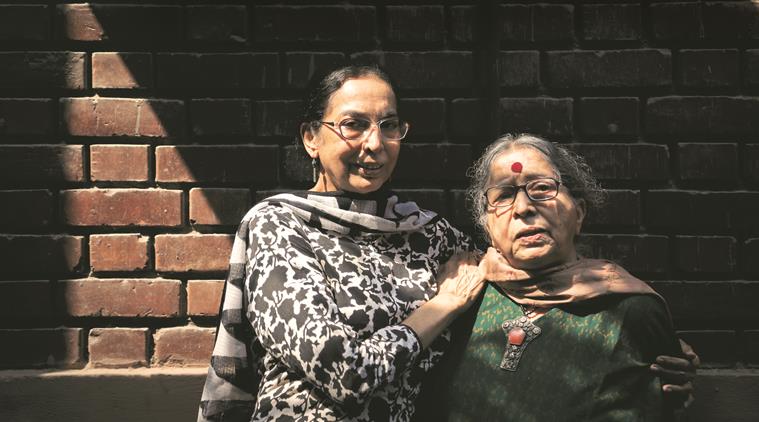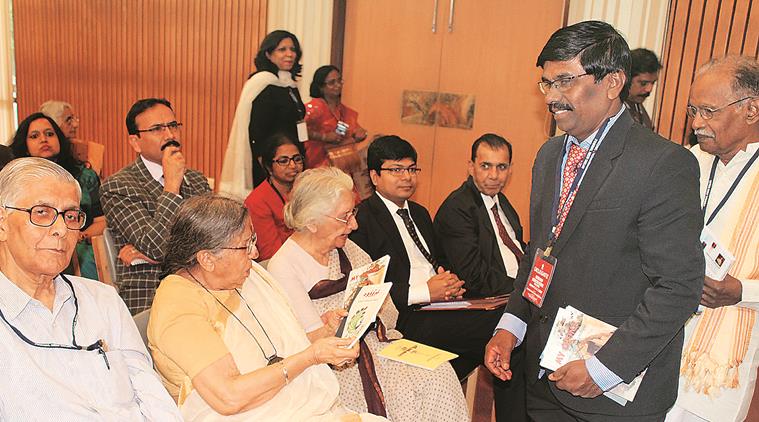Ties That Bind
Author Ajeet Cour and her daughter, artist Arpana Caur, hope to strengthen ties between authors in the subcontinent through South Asian Literature Festival.

Arpana Caur with mother, Ajeet Cour. (Express photo by Abhinav Saha)
Author Ajeet Cour still remembers how, when she envisioned a writers conference in 1985, it was authors from Pakistan whom she yearned to invite first. For more than a year, she negotiated with the-then government to arrange for their visas, and at the first literature meet organised by her in 1987, she had 10 of them, including Intizar Hussain and Ahmed Faraz, sharing the stage with their Indian counterparts such as Kamleshwar. More than three decades hence, the festival has grown to feature authors from all SAARC nations (sans Pakistan in the last two years though). “The atmosphere is such. We can’t do anything,” says Cour.
In the red brick building of her Academy of Fine Arts and Literature in Delhi’s Siri Fort, she is seated outside a hall packed with delegates participating in the recent edition of the literature festival that concluded on October 7. She shares how she has built a personal relationship with each of the invitees over the years. “They are like family. We would feel odd if we do not meet,” says artist Arpana Caur, who is Cour’s daughter. The author shares how the largely self-funded initiative has sustained through Caur’s earnings as an artist. “She has taken care of all my eccentricities. Even this building was built painting by painting and not brick by brick. Likewise, the festival has continued because of Arpana’s career as an artist,” says Cour. The doting daughter adds, “I always tell her we will manage to the best of our ability. Somehow it happens, out of will, magic.”
Caur still remembers her growing-up years amidst authors such as Shiv Batalvi, Amrita Pritam and Krishna Sobti, who were frequent visitors to their house. She illustrated Khushwant Singh’s Hymns of the Sikh Gurus, and in 1980, Faiz Ahmed Faiz published works from her ‘Naukrani’ series in his magazine, Lotus. “I was 14 or 15 when my mother exposed me to so-called heavy literature. In my first group show in 1974, I had dedicated a work to Oedipus and his mother Jocasta. In the 1980s, I based a work on Vijay Tendulkar’s play Sakharam Binder,” says Caur.
When Cour planned the first conference, she would see her mother struggle with the logistics. Almost every other year after 1987, Cour would invite authors from different countries of the subcontinent, until in 1999, when she got a phone call from Meera Shankar, the-then Joint Secretary in the SAARC division of the Ministry of External Affairs. “The government wanted to hold a literature festival with writers from SAARC countries. Shankar shared how the SAARC Charter did not include any form of cultural exchange. After our work for two years, the charter was amended and a cultural wing was included in it. We got registered as the Foundation of SAARC Writers and Literature (FOSWAL), and became the apex body,” says Cour, recalling how she contacted consulates in India to suggest authors who should be invited. Over the years, she has continued the practice but official support from the Indian authorities has “dwindled”. “The government now just reimburses 40 per cent of the total expenses,” says Cour.
This year, the four-day conference saw over 100 delegates. “It keeps authors from the region connected,” says Bangladeshi author Selina Hossain, who has attended several editions of the conference since 2000. Nepali poet-playwright Abhi Subedi applauds the efforts put in by the duo. “In the present times, it has become even more relevant. It is commendable that despite her personal struggles and other difficulties, she (Cour) conceived of the festival and has continued with it,” adds Subedi.
One of leading names in Punjabi literature, Cour’s turbulent life is known to most. She has also written about it in her autobiography that was translated to English earlier this year. Titled Weaving Water, Cour shares her troubled past, from an abusive marriage to struggles as a single parent and losing her daughter Candy in an accident in France. “There are certain happenings in life that you cannot overcome. You have to deal with them,” says Cour.
She rues the current state of Punjabi literature but is pleased about the several literature festivals now taking place across India. “My health does not allow me to travel and I haven’t been able to attend any, but it is wonderful that authors are coming together and interacting with their readers,” she adds.






















 Delegates during the South Asian Literature Festival held in Delhi recently.
Delegates during the South Asian Literature Festival held in Delhi recently.
No hay comentarios:
Publicar un comentario